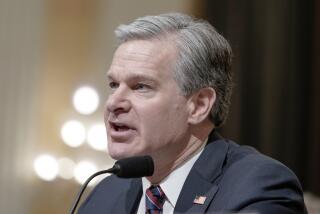Casey Warns of Global Soviet ‘Bridgeheads’
- Share via
WASHINGTON — In a rare public appearance, CIA Director William J. Casey charged Sunday that Soviet leader Mikhail S. Gorbachev is entrenching Soviet “bridgeheads” worldwide--to the point, he asserted, of sending Soviet pilots against government forces during a coup in South Yemen in January.
Addressing a major pro-Israel lobby, the American Israel Public Affairs Committee, which is meeting here, Casey also said that the CIA has increased cooperation with the security services of Israel and moderate Arab states in the fight against terrorism. He declined to give details.
Casey, who was the keynote speaker at a three-day meeting of the lobbying group, painted a broad picture of U.S. efforts to curb Soviet expansion and terrorism practiced by nations allied to the Kremlin.
Areas of Activity
The Soviets, he said, “require bridgeheads in Cuba and Vietnam, in South Yemen and Ethiopia, in Angola and Nicaragua, in Afghanistan and elsewhere. And these bridgeheads are being linked in a growing logistical and support network, supported by a standing Soviet naval and air power.
“And we have a new Soviet leader, Mr. Gorbachev. And already a hallmark of his regime is an intensified attempt to nail down and cement these bridgeheads, make them permanent,” he said.
“Recently, we have seen the application of the Brezhnev Doctrine, which says that once Communist, always Communist,” Casey went on, referring to a policy attributed to the late Soviet President Leonid I. Brezhnev, who sent Soviet troops into Czechoslovakia to crush the 1968 reformist movement there.
In South Yemen, Casey said, the government “had begun to open up to the West. Hard-line pro-Soviet exiles returned from Moscow, and initiated a coup against the South Yemen president,” Ali Nasser Hasani.
“This coup soon escalated into a bloody civil war between military and tribal elements loyal to the president and those of the hard-line Soviet camp there,” he said.
“After the Soviets watched the blood flow for a few days, planes flown by Soviet pilots began pounding pro-government forces, and Soviet weapons began to be flown into the country to rebel forces,” said Casey, in what was apparently the first accusation of direct Soviet involvement in the coup that ousted Hasani in mid-January.
To cope with the threat of terrorism from Syria, Libya and Iran, Casey said, “the United States has strengthened and invigorated its strategic cooperation with Israel.”
He said the “cooperation . . . has included and features enhanced cooperation in our intelligence exchanges between the (Israeli) Mossad and the American intelligence community. And particularly in the field of terrorism and counterterrorism.”
“At the same time, we have also expanded our cooperative relationship with friendly Arab states, who also see a Soviet and radical danger. Together, we must fight terrorism, a threat which threatens all our friends in the Middle East and elsewhere,” he said.
Asked to elaborate on U.S. cooperation with Arab intelligence services, Casey replied: “I’m not going to get very specific on that. But I will say that there has evolved over recent years a worldwide anti-terrorist network which is based on the active intelligence exchanged among the security services of moderate Arabs, Europeans, all of our friends everywhere.
“We do a lot of training, we provide technical service to improve the capabilities of their services, and we collaborate with them in counterterrorist actions,” he said.
More to Read
Sign up for Essential California
The most important California stories and recommendations in your inbox every morning.
You may occasionally receive promotional content from the Los Angeles Times.









